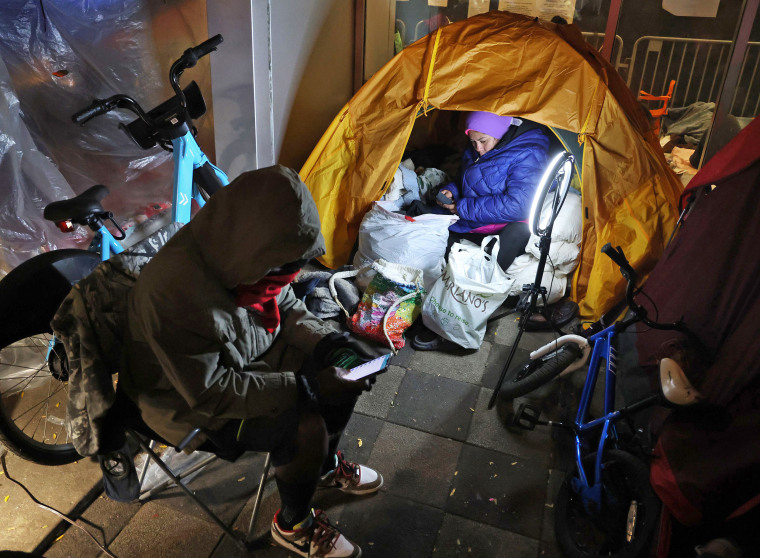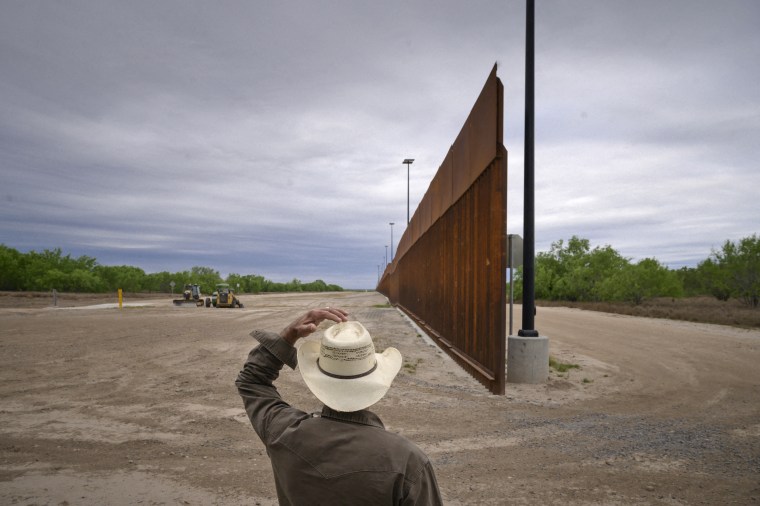[ad_1]
WASHINGTON — Worried about the large numbers of people crossing the border from Mexico, Rep. Henry Cuellar of Texas went to White House officials with some advice: Get the word out about all the people the Biden administration has been deporting in hopes of deterring undocumented migrants from entering the country.
Joe Biden’s advisers weren’t sold. “They said it would anger the immigration advocates — it would anger their folks on that,” Cuellar, a Democrat, said in an interview.
The explanation captures the president’s dilemma and the delicate balance he has tried to strike when it comes to the fraught issue of immigration. Biden is facing a monumental crisis as unlawful border crossings spike and migrants arrive in crowded cities with no jobs or places to sleep, stirring resentment among Democratic governors and mayors who are part of his governing coalition. At the same time, tough enforcement measures risk alienating Hispanic voters who are part of Biden’s political base.
So far, no one seems satisfied. Democrats have seen their advantage over Republicans on border and immigration issues vanish. NBC News polling shows the GOP now holds an 18-point lead when it comes to handling immigration. During Donald Trump’s presidency, the Democratic edge hovered between 4 and 6 points.
New polls suggest that Trump is eating into Biden’s lead among Latino voters. A survey conducted for UnidosUS and Mi Familia Vota showed Biden leading by 18 points among Latino voters. That margin shows considerable slippage since the 2020 election, when Biden won the Latino vote by 33 points, according to exit polls.
Rep. Dean Phillips, a Minnesota Democrat who is challenging Biden for the party’s presidential nomination, said he has made two trips to the border and found it to be “an unmitigated, embarrassing, inexcusable disaster.”
“It is the result of generations of failure and either an inability or unwillingness to address it,” Phillips said in an interview. “Our ports of entry are abhorrent. Our security is insufficient and our policies woefully inadequate for the 21st century.”
Biden allies see an opportunity for him to recover lost ground on immigration before the 2024 general election, but it appears to be fading.

Quietly, Biden administration officials are hoping that border talks happening on Capitol Hill will produce some sort of bipartisan solution. Some officials would like to see a policy change that makes it harder for people to gain entry into the U.S. by claiming asylum. That would ease the pressure on immigration judges who face a backlog of more than 1 million pending asylum cases. The issue is one of the sticking points for Senate negotiators who are working on a proposal aimed at revising outdated border and immigration policies.
One Department of Homeland Security official told NBC News there is a fear that if Congress does not fix the asylum system now, Trump would have an opening to enact more draconian policies if he wins next year.
Biden has another incentive to agree to more restrictive asylum policies — he dearly wants more money for Ukraine so that it can repel Russian forces. The president has put forward a supplemental spending request that would go toward helping Ukraine and Israel in their respective wars, which Republicans in Congress want coupled with strict new border provisions.
Privately, administration officials have told Senate Republicans they are open to tougher asylum policies, a position that has emboldened the Republican negotiators while frustrating the Democratic lawmakers involved, a person familiar with the talks said.
White House aides have been consulting Democratic lawmakers about the talks. And if senators are able to strike a deal to Biden’s liking, that could enable him to show progress in clamping down on the influx of migrants that has overwhelmed the resources of cities like New York and Chicago.
But lawmakers left town this week without an agreement after hoping to make a breakthrough by week’s end. All the discussions may prove fruitless.
“We’re stuck,” Sen. Lindsey Graham, R.-S.C., told reporters.
A shifting issue
Not long ago, Democrats had the upper hand when it came to immigration. Then-President Barack Obama pushed for comprehensive immigration reform that would offer a path to citizenship for the 11 million people living in the U.S. illegally.
Congress never passed it into law, but the idea was considered a winning political issue. After Republicans lost the 2012 presidential race, they undertook an “autopsy” and concluded their steadfast opposition to an immigration overhaul was costing them votes.
Much has changed since then. The debate over immigration has shifted from finding a humane way to deal with undocumented immigrants already living in the U.S. to stopping more from coming in. On his first day in office, Biden put forward a bill that would provide a vehicle for undocumented immigrants to become U.S. citizens. It has gone nowhere in Congress; Biden has been reluctant to invest scarce political capital into passing the bill at the expense of other legislative priorities like upgrading the nation’s infrastructure.
“In nearly three years since [Biden took office], Congress has failed to act on it,” a White House official said, speaking on condition of anonymity to discuss policy-making. “Because of their failure, the administration has focused on implementing a strategy of humane, safe and orderly enforcement, and have put in place policies to process individuals in a fair and fast manner, and continue to remove those without a legal basis to remain in the United States.”
When he was president, Trump described sending migrants to Democratic-run cities as his own “sick idea.” In a sign of how the immigration debate has shifted, Trump’s “sick idea” has gone mainstream. Republican governors Greg Abbott of Texas and Ron DeSantis of Florida managed to divide Democratic officials by sending undocumented immigrants into blue cities and states. Strained by the influx, Democratic mayors and governors have in some cases blamed the White House for not doing enough to ease the burden.

Illinois Gov. J.B. Pritzker sent a letter to Biden in October warning of a migrant “crisis” in his state and faulting the administration for a lack of “intervention and coordination at the border.”
Flying with the president on Air Force One the following month, Pritzker, a Democrat, again raised the issue of migrants entering his state and seeking asylum.
The migrants, coming mostly from Texas, needed proper housing and other resources that Illinois was hard-pressed to provide. “The president understood his frustration and immense need for more aid,” a person with the governor’s office told NBC News.
New York City Council members traveled to Washington, D.C., earlier this year to talk to Biden administration officials and lawmakers about a crisis that has forced migrants to sleep on streets in some cases.
“It’s not the responsibility of a municipality to finance or manage an international migrant crisis,” Justin Brannan, a Democratic city councilman who was on the trip, said in an interview. “The city doesn’t have a Department of Resettlement. We don’t have the agencies or the bandwidth or the expertise to do that.”
“Honestly, the lack of response from the White House has been puzzling,” he added.
‘No clear wins’
Controlling the border has bedeviled Biden from the start. In fiscal year 2021, which included most of Biden’s first year in office, Customs and Border Protection agents stopped 1,734,000 migrants who were not legally allowed into the U.S. The following year, that number rose to 2,379,000; in fiscal year 2023, it reached 2,475,000.
“If you look at it historically, the numbers [of people crossing the border illegally] would rise and drop according to the season,” Cuellar said.
“You see what’s happening in New York and other places: They’re overwhelmed,” he added. “We’re letting too many people overwhelm cities in the North, and it certainly affects our legitimate trade and tourism.”

The White House’s stock response has been to blame Republicans for failing to engage in substantive discussions over Biden’s comprehensive reform proposal, while also noting that Biden has called for additional resources for the border as part of his budget proposal.
Officials also emphasize that long-term solutions involve not just reforming the U.S. immigration system but tackling what they call the root causes of migration — especially political instability and economic distress in Central America.
But long-term solutions won’t solve his near-term challenges heading into an election year. Biden would like economic gains on his watch to be front and center in the 2024 election. He wants voters to see Trump as an avatar of creeping authoritarianism.
But Americans indeed care about what’s happening at the border, and the large number of illegal crossings are a point of vulnerability for Biden. An NBC News poll in November showed that border security and immigration ranked third among the issues that voters felt so strongly about that they might vote for or against a candidate on that basis alone (democracy ranked first and abortion second). About three-quarters of people surveyed wanted to see more money go toward fortifying the border with Mexico; that’s a greater share than those who want to see more funding for the Israeli and Ukrainian war efforts.
Another problem for Biden is his inability to come up with a succinct, clear-cut explanation of his border policy, immigration advocates and lawmakers contend. His approach to what is undoubtedly a complicated problem defies easy explanation. By contrast, Trump’s solution is simple — if severe and impractical — centered around building an impregnable wall.

Finding an effective way to discuss immigration has long confounded Democrats. Party leaders fear being portrayed as advocates for “open borders,” yet if they come out in favor of tough immigration enforcement strategies, that might offend a key constituency.
Biden’s policies involve carrots and sticks: opening up pathways to legal migration while simultaneously discouraging the illegal kind. For voters who might not be riveted to the blow-by-blow, his approach can seem muddled.
A case in point is the Biden administration’s treatment of Venezuelans living in the U.S. illegally. In September, the administration made them eligible for temporary protected status if they had arrived before August, meaning they could work and live in the U.S. without fear of being sent back to their home country, a hotbed of instability. The policy was in direct response to calls from New Yorkers and other Democratic stronghold cities to allow migrants sleeping on their streets to be able to work and support themselves.
One month later, the administration resumed direct repatriation flights for Venezuelans who unlawfully crossed the border later in the year and “do not establish a legal basis to remain.”
It’s not hard to imagine that the dual policies could create confusion about who’s at risk of being deported and who’s safe.
“One day, they do something positive that shows a path forward. And the next day, they revert to the policies that are draconian,” said Vanessa Cárdenas, executive director of America’s Voice, a pro-immigration advocacy group. “It reinforces this notion that the White House doesn’t have it together when it comes to immigration. It’s hard for voters to figure out where they stand.”
The Biden administration’s explanations about its border policy have been “very confusing,” said Janet Murguía, president of UnidosUS, a Hispanic civil rights and advocacy group. “There are no clear wins for him. It’s one step forward and two steps back. And that’s not a recipe for success in terms of making a case.”
Even seasoned immigration advocates were stunned when the Biden administration announced in October that it was waiving a string of federal laws to build more border wall in Texas. As a candidate in 2020, Biden had pledged that he would not build “another foot of wall.”
Cárdenas said she was observing a focus group of Hispanic voters around this time. “They were so disappointed when they heard about the wall,” said Cárdenas, who worked on Biden’s 2020 presidential campaign. “That was one of the reasons they didn’t like Trump and voted against him. The reaction they had was: ‘Here’s another promise broken.’”
“It doesn’t help politically because it doesn’t help with the contrast that we want to make” with Trump, Cárdenas continued. “As advocates, it’s hard to make the point when you have Trump-lite policies.”
In its defense, the White House said that Congress had approved the wall construction funds when Trump was in office and the money couldn’t be used for other purposes.

Trump’s vulnerabilities
Biden is at no real risk of losing the Democratic nomination, but Republicans plan to raise the border issue at every turn once the general election campaign kicks in.
Biden still has nearly a full year before the election either to neutralize the issue or swing it to his advantage. Trump’s plans to safeguard the border offer a ripe target for a well-funded opposition campaign. One idea he privately floated to top Homeland Security officials during his presidency was building a moat at the border and filling it with alligators and snakes that would deter migrants from crossing, Miles Taylor, a former department official, wrote in his book, “Blowback.” Trump dropped the idea when officials told him a “reptile-filled moat” spanning the 2,000-mile border would cost billions of dollars, Taylor wrote.
In an early sign of how Biden will treat immigration issues during the race, his re-election campaign recently focused on reports of new immigration measures Trump would enact if elected again, including piling undocumented immigrants into detention camps.
“Donald Trump wants to play dictator and weaponize the government to round up immigrants, separate families, and force them into mass detention camps,” the campaign said in a statement. “He has no real plan to improve border security and reform our immigration system.”
A heartening piece of history for Biden is that the GOP’s past efforts to capitalize on the immigration issue have fallen flat. Before the 2018 midterm elections, Trump warned of caravans of migrants heading to the U.S. through Mexico. Still, Democrats wrested control of the House that year.
“Ultimately, Republicans have struggled to make this the defining issue in an election in the way they would want to,” Kate Bedingfield, Biden’s former White House communications director, said in an interview. “That doesn’t mean Democrats should ignore it. But I don’t think we’ve seen evidence in recent elections that it winds up being the anchor around Democrats’ necks the way that Republicans want it to be.”
[ad_2]
Source link
